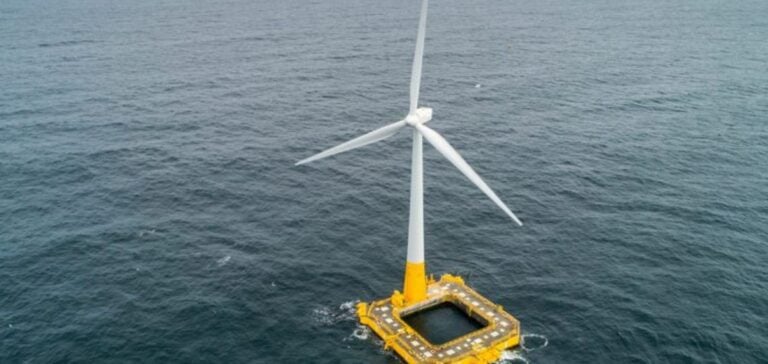The Maltese government is launching a public consultation on national policy for the deployment of offshore renewable energies. This initiative marks a crucial step towards making Malta carbon neutral within 25 years. Offshore wind power generation is a key element of this strategy, particularly in Malta’s exclusive economic zone. The national project “Hydro-pneumatic Energy Storage for Offshore Green Hydrogen Generation” (HydroGenEration), funded by the French Energy and Water Agency, illustrates this commitment. This project, carried out at the University of Malta in collaboration with FLASC B.V., focuses on energy storage and green hydrogen production using floating wind turbines.
Innovative technology and technical challenges
HydroGenEration is exploring the use of floating wind turbines to produce green hydrogen, a zero-impact fuel, directly at sea. Floating wind turbines make it possible to install wind farms in deeper maritime zones, far from the coast, thus reducing the socio-environmental impact. The project is based on the hydro-pneumatic energy storage concept developed and patented by the University of Malta. This technology uses pressurized seawater and compressed air to stabilize the production of renewable electricity and improve the lifespan of electrolyzers. The project aims to power an offshore hydrogen production unit with fluctuating wind energy, smoothing out production variations for more stable and efficient use. Preliminary results show a significant reduction in electrolyzer shutdowns and restarts, increasing hydrogen production and reducing energy losses.
Outlook and environmental impact
The HydroGenEration project could transform Malta’s energy sector. Using floating wind turbines and hydro-pneumatic energy storage, Malta can produce green hydrogen to power the maritime sector and reduce CO2 emissions. Preliminary studies show that the project could power around 102,000 hydrogen-powered cars, reducing CO2 emissions by 64,193 tonnes a year. The choice of sites for these offshore installations was based on rigorous criteria, including wind conditions, bathymetry, seabed composition and proximity to ports. Environmental impacts have also been taken into account, incorporating special marine conservation areas and special protection zones. Webinars were organized to present these potential sites and gather feedback from stakeholders.
A model for the future
The HydroGenEration project could serve as a model for other similar initiatives in the Mediterranean and beyond. By stabilizing offshore wind energy for the production of green hydrogen, Malta could become a leader in renewable technologies and sustainable energy solutions. The collaboration between the University of Malta, FLASC B.V., and industrial players demonstrates the importance of public-private partnerships for a successful energy transition. This project is part of a global vision for a sustainable energy future, using technological innovations to overcome climate challenges. By promoting green hydrogen as a clean fuel, Malta is taking concrete steps to reduce its dependence on fossil fuels and protect the environment.
Introduction to the HydroGenEration project
The “Hydro-pneumatic Energy Storage for Offshore Green Hydrogen Generation” (HydroGenEration) project is a research and innovation initiative funded by the Energy and Water Agency under the National Strategy for Research and Innovation in Energy and Water (2021-2030). This project, underway at the University of Malta, in collaboration with the Department of Mechanical Engineering and University spin-off FLASC B.V., based in the Netherlands, focuses on the use of floating wind energy to producegreen hydrogen at sea. Hydro-pneumatic energy storage technology, developed and patented by the University of Malta, uses pressurized seawater and compressed air to stabilize renewable electricity production and extend the life of electrolyzers. This system smoothes out fluctuations in wind energy production, guaranteeing a more stable power supply for the offshore hydrogen production unit.
Advantages of floating wind turbines
Floating wind turbines offer several advantages over traditional fixed turbines. They can be installed in deeper marine areas, far from the coast, reducing visual and environmental impact. This is particularly important for Malta, a country with a high urban concentration along its coasts. The HydroGenEration project uses floating wind turbines to power an offshore hydrogen production unit. The hydrogen produced is then stored in compressed form and can be used as a clean fuel for various sectors, including the marine sector. This project aims to demonstrate the feasibility and effectiveness of using floating wind energy to produce green hydrogen, thereby contributing to the transition to a low-carbon economy.
Challenges and opportunities
The HydroGenEration project presents a number of technical and logistical challenges, particularly with regard to the maintenance of offshore facilities and connection to the power grid. The success of this project will depend on overcoming these challenges and optimizing the performance of the hydro-pneumatic energy storage system.
Despite these challenges, the opportunities offered by this project are considerable. By using floating wind power and hydro-pneumatic energy storage, Malta can reduce its dependence on fossil fuels, cut greenhouse gas emissions and promote innovation in the renewable energy sector. What’s more, this project could serve as a model for other countries and regions, demonstrating the benefits of integrating energy storage and green hydrogen production technologies.






















